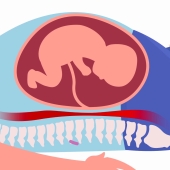Women in SLE remission have much less trouble than do women with active disease. Their babies do much better, and everyone worries less. Good health rules are essential: eat well, take medications as prescribed, visit your doctor(s) regularly, don’t smoke, don’t drink, and certainly don’t use "recreational" drugs.
Frequent doctor visits are important in any high risk pregnancy because many conditions which may occur can be prevented, or treated more easily, if found early. About 20 percent of women with lupus will have a sudden increase in blood pressure, protein in the urine, or both during pregnancy. This is called toxemia of pregnancy (or pre-eclampsia, or pregnancy-induced hypertension). It is a serious condition that requires immediate treatment and often immediate delivery of the baby. Toxemia is more common in older women, in black women, in women with twins, in women with kidney disease, in women with high blood pressure, and in women who smoke.
Serum complement and blood platelet count may be abnormal in these cases. Since complement levels and blood platelet counts are also abnormal during SLE flares, it may be difficult for the doctor to be certain that a flare is not causing these symptoms. If toxemia is promptly treated the woman should be in no danger, but there is a high risk that the baby will die if it is not rapidly delivered. If toxemia is ignored, both the woman and her baby are in danger.
As pregnancy progresses it is often wise for the doctor to check the baby’s growth with sonograms (which are harmless). The doctor should also regularly check the baby’s heart beat. Abnormalities in either the baby’s growth or its heart beat may be the first signs of trouble that can be treated.
- 17 views













